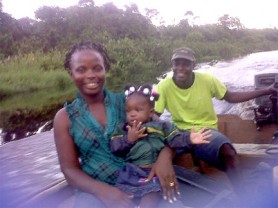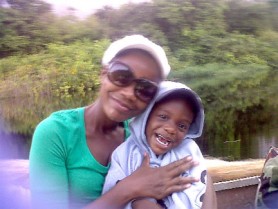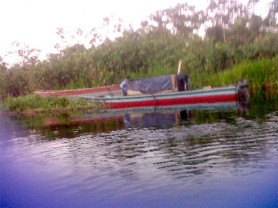I was excited about my trip as not only was I about to visit Baracara, a colourful community located in the Canje Creek, but I was also going to spend some quality time with my siblings, a rarity in recent times.
There was excitement all around since my son and nephew could not stop the chatter about “going in a boat”; and my sister and friend were talking a little too much about their expectations of the trip. Little did we know that the journey would have been such an eventful one; the almost one-week stay in Baracara had nothing on it.

It was a sunny Wednesday afternoon when we departed a stelling at New Amsterdam. The occupants of the small boat that was outfitted with a motor engine included my brother-in-law Lennox La Fleur, who was the captain of the small boat; my youngest sister, one of two who are now residents of Baracara; another sister and her two children; my friend on her first journey to the area; my mom; me and my son and another passenger and her young daughter.
At first we were told the trip would have taken five hours then maybe seven, but knowing the area and the residents as I do, I figured that we would have arrived at our destination at 10 pm the latest.
‘Stop offs’
It was not to be. We were not forewarned that grass was being cut in the creek (an annual exercise) or we would have known that this would have definitely impeded our journey. The species of grass that grows along the banks of the Canje stretches out into the water, sometimes as far as the opposite bank. As you would imagine this poses a difficulty to boats traversing the waterway. As a result, once a year, the Region Six administration contracts residents of the area – mostly from Baracara – to cut the grass.

Different persons are selected every year and while they make “a small piece”, many said they would prefer if there were no grass so they can transport their produce and lumber without the impediment. Some residents suggested that the regional administration contract someone with hymac machines to get rid of the grass from the banks which would in the process get rid of the roots. They pointed out that because the men use cutlasses the roots remain and soon sprout again. Clumps of the cut grass are left to float down the canal and eventually into the Berbice River.
Four hours into our journey, it began to rain. Fortunately, my brother-in-law and sister were equipped with plastic that shielded us from the raindrops. By 7 pm we were restless and decided to sing to pass the time. Belting out gospel tunes helped, but eventually, the children grew tired – not of our voices, but of the long journey – and became fretful. It was around this time that we came to a ‘stop off’, which turned out to be clumps of the cut grass that had become entangled and blocked the canal from bank to bank. This can happen at several different locations in the canal and impedes the progress of boats.
“I know this woulda happen because I didn’t see today grass,” my brother-in-law said as he stopped the engine, alerting us to the fact that something was wrong. It was so dark that I had to look keenly to observe the tangled grass.
The boat could not move and the captain said that without a rope we could not tear the grass apart. By then swarms of mosquitoes had descended on us and we were all swiping and the children were crying. Lennox sought the assistance of a nearby resident who had no rope.
“Well the most I can suggest now is for us to spend the night at someone,” Lennox told the boat of weary travellers but his words sounded like music to us as by then the mosquitoes were waging a battle to bodily lift us out of the boat. In remote areas everyone knows everyone and Lennox took us to someone he knows who even though living in a small house readily agreed to let us bed down for the night. We took up space wherever possible some of us in our damp clothing, but by then we really did not care. Dinner was even offered but most of us were too tired to accept.
At the crack of dawn we were up again and the grass was awaiting us again but this time another boat was stuck and we helped each other out.
We eventually came upon some of the grass cutters who expressed sympathy for our plight but said they were doing their best. Some of the men were dressed in tights which we found funny, but Lennox gravely explained that the tights are needed as the men spend hours in the water and without them the inside of their legs would blister. Lennox was once contracted to cut the grass.
‘He wake up back’
Onward we went until we got to another of those hateful ‘stop offs’ which was being untangled by two men with long poles, dressed in their tights. Lennox joined in and things quickly got better, but not before we observed that the carcass of dog was also tangled in the grass. It was fortunate that we had had no breakfast. My four-year-old nephew Andel was told by his mother that the dog was dead, but he quickly shouted, “Mommy, look he wake up back he eye open!” The dog’s eyes were indeed open and thankfully that was the only thing Andel noticed and not the foul smell of the carcass.
Two more carcasses — a cow and another dog — and about two hours later, we finally arrived at Baracara, tired and hungry. But the joy on the faces of my nephew and nieces and my sister Denise, Lennox’s wife, who were all awaiting our arrival compensated for all the discomfort.

Baracara is not the village I remember from years gone by; then it was ‘a happening village’. During our visit nothing was happening and my friend wanted to leave after two days. The people who live there are still some of the most colourful I have met in my life, their speech and way of life are unique; unlike anything I have come across anywhere else. Some explained to me that the high tide was “mashing up” their farms and it making it difficult for them to do logging so the village was in a “depressed mode”.
The visit was not a lost cause as it was good spending time with my sisters, Denise and Akeisha, and my son got to know his cousins. But I was happy when it was time to make another journey, this time uneventful, through the Torani Canal on our way to DeVeldt–the community from which I originated. A delightful week was spent there catching up with my endless relatives, some of whom I had not seen for about a decade.
I may make another trip to Baracara; maybe in another 10 years. But I would be sure to ask questions prior to visiting. Hopefully by then the powers that be would have done something about the grass that all but strangles travel to the various communities in the Canje Creek. It was pointed out should there be a medical emergency during the grass cutting period, a person could succumb long before reaching New Amsterdam.





